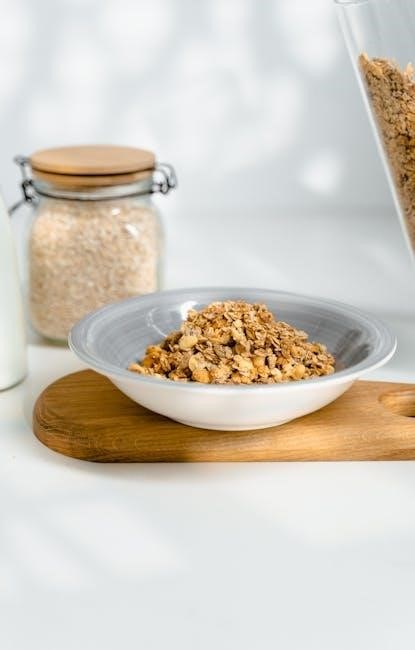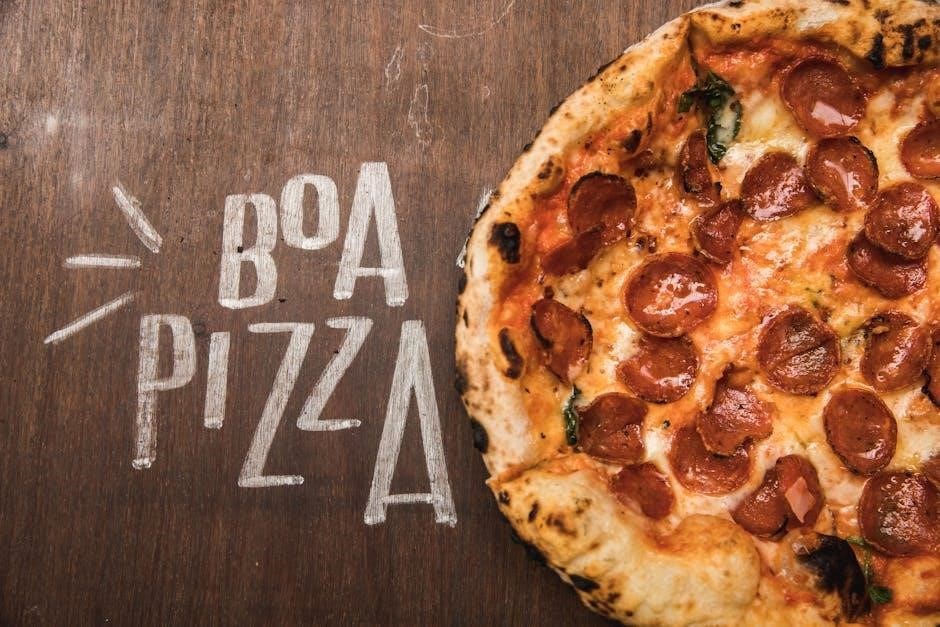Understanding the Daniel Fast Meal Plan
The Daniel Fast is a 21-day plant-based diet inspired by Daniel’s fasting in the Bible. It focuses on whole foods like fruits, vegetables, whole grains, nuts, and seeds, while avoiding animal products and processed foods. This structured eating plan encourages spiritual reflection and physical cleansing, with many resources like meal plans and grocery lists available to guide participants; It’s often used for consecration, worship, and detoxification, promoting a deeper connection with faith and health.

Overview of the Daniel Fast
The Daniel Fast is a 21-day partial fast inspired by the biblical prophet Daniel’s fasting experiences. It involves abstaining from certain foods as an act of worship and consecration to God, focusing on spiritual growth and physical cleansing. The diet is plant-based, emphasizing fruits, vegetables, whole grains, nuts, and seeds, while avoiding animal products, dairy, eggs, and processed foods. This structured eating plan encourages participants to rely on whole, nutrient-rich foods for nourishment. Many people undertake the Daniel Fast for spiritual renewal, improved health, and detoxification. It has gained popularity as a way to deepen faith while promoting physical well-being. The fast is not a traditional fast but rather a dietary restriction that honors biblical principles. Resources like meal plans and grocery lists are widely available to help individuals follow the fast successfully. The Daniel Fast has been credited with benefits such as weight loss, improved energy levels, and enhanced mental clarity, making it a popular choice for those seeking a holistic approach to health and spirituality.
Foods Allowed and Restricted
The Daniel Fast adheres to a strict dietary regimen inspired by biblical principles. Foods allowed include fresh fruits, vegetables, whole grains, nuts, seeds, and water. These foods are emphasized for their natural and nutrient-rich qualities. Restricted foods include red meat, poultry, fish, seafood, dairy products like milk, cheese, yogurt, and butter, eggs, and processed foods. Additionally, legume-based products such as peanut butter are not permitted. The fast encourages a plant-based diet, avoiding any animal-derived foods. It’s important to focus on whole, unprocessed foods to align with the fast’s intent. By eliminating these restricted foods, participants aim to detoxify their bodies and deepen their spiritual connection. The Daniel Fast is not just about abstaining from certain foods but also about embracing a healthier, more disciplined eating habit. This structured approach helps individuals honor their commitment while nourishing their bodies with wholesome ingredients. The clear guidelines ensure clarity and consistency throughout the fasting period, making it easier to stay on track. Proper planning and understanding of these restrictions are key to a successful Daniel Fast experience.

Sample 7-Day Meal Plan

A sample 7-day Daniel Fast meal plan provides a clear and structured approach to maintaining the diet. It starts with breakfast options like fresh fruits, oatmeal, or smoothies made from allowed ingredients. Lunches often feature hearty salads, vegetable-based soups, or whole grain wraps with hummus and vegetables. Dinners include stir-fries with a variety of vegetables, quinoa bowls, or lentil-based dishes. Snacks are simple, such as nuts, seeds, or fresh fruit. This meal plan emphasizes variety and flavor, ensuring meals remain satisfying and nutritious. By repeating this plan, participants can simplify their 21-day fast, reducing meal preparation time. The plan also encourages creativity, allowing individuals to swap ingredients based on personal preferences and availability. It serves as a practical guide, helping participants stay consistent and focused on their spiritual and health goals. The structured meals ensure that every day is balanced and aligns with the principles of the Daniel Fast.
Incorporating Variety and Protein

Incorporating variety and protein into the Daniel Fast meal plan is essential to keep meals engaging and nutritionally balanced. Plant-based protein sources like lentils, chickpeas, black beans, and quinoa are excellent additions to dishes. These foods not only provide protein but also add texture and flavor to meals. Incorporating a variety of colorful vegetables ensures a broad spectrum of vitamins and minerals. Whole grains, nuts, and seeds also contribute to the nutritional diversity of the diet. Creative meal ideas include lentil soups, vegetable stir-fries with tofu, and salads topped with chickpeas or black beans. Adding herbs, spices, and seasonings can enhance flavors without compromising the fast’s guidelines. By exploring different recipes and ingredients, participants can enjoy a wide range of delicious and satisfying meals. This approach prevents monotony and ensures the diet remains exciting and fulfilling throughout the 21 days. Proper planning and creativity make it easy to maintain variety and meet protein needs while adhering to the Daniel Fast principles.

Meal Prepping for Convenience
Meal prepping is a fantastic way to simplify the Daniel Fast and ensure convenience throughout the week. By preparing meals in advance, you can save time and maintain discipline during the fast. Start by cooking large batches of grains like brown rice, quinoa, or oats, which can be used as bases for multiple meals. Soups, stews, and salads can also be made in bulk and refrigerated or frozen for later use. Chop fresh fruits and vegetables at the beginning of the week to make healthy snacks and meal additions quick and easy. Portion out meals in containers for grab-and-go convenience, ensuring you have nutritious options readily available. Label and date each meal to keep track of what you’ve prepared. Meal prepping not only saves time but also helps you stay committed to the Daniel Fast by reducing the temptation to make last-minute, less-healthy choices. This practical approach allows you to focus on your spiritual journey while maintaining a balanced and satisfying diet.
Spiritual Component
The Daniel Fast is deeply rooted in spiritual purpose, drawing inspiration from the prophet Daniel’s commitment to prayer and fasting. This 21-day period is often used as a time for consecration, worship, and seeking a deeper connection with God. Many participants incorporate daily prayer and Bible study into their routine, using the discipline of fasting as a means to focus on spiritual growth. The act of abstaining from certain foods is seen as a form of sacrifice, mirroring Daniel’s refusal of the king’s indulgent foods. This spiritual component encourages participants to reflect on their relationship with God, seeking guidance and renewal. Resources such as devotionals and prayer guides are often used alongside the meal plan to enhance the spiritual experience. The combination of physical cleansing and spiritual focus creates a holistic approach to fasting, helping individuals align their bodies and souls with biblical principles. This period is not just about food but about fostering a deeper faith and humility before God.
Managing Energy Levels
During the Daniel Fast, managing energy levels is crucial, especially since the diet focuses on plant-based foods that may initially leave some feeling fatigued. To maintain energy, it’s important to balance meals with protein-rich foods like beans, lentils, and nuts, as well as complex carbohydrates from whole grains. Incorporating healthy fats from avocados, seeds, and olives also supports sustained energy. Staying hydrated with water is essential, as dehydration can exacerbate feelings of fatigue. Additionally, avoiding overexertion and ensuring adequate rest helps maintain physical and mental stamina. Some participants find that eating smaller, frequent meals throughout the day prevents energy dips. Listening to your body and adjusting your diet as needed is key. While the fast may require some adjustments, many people report increased energy levels after their bodies adapt to the new diet. Spiritual practices like prayer and reflection can also provide emotional and mental strength, helping to overcome physical challenges during the fast.

Grocery Shopping Tips
Grocery shopping for the Daniel Fast requires careful planning to ensure you have the necessary ingredients for delicious and compliant meals. Start by planning your meals for the week, using a Daniel Fast meal plan PDF as a guide. Focus on buying whole, unprocessed foods like fruits, vegetables, whole grains, nuts, and seeds. Bulk purchases of items like brown rice, quinoa, lentils, and oats can save time and money. Fresh produce should be a priority, so stock up on a variety of colorful fruits and vegetables. Consider shopping the perimeter of the grocery store, where fresh and whole foods are typically located, and avoid the aisles filled with processed items. Don’t forget to include healthy fats like avocados, olives, and olive oil. For convenience, look for pre-washed greens, frozen vegetables, and prepared hummus or guacamole. A well-stocked pantry and fridge will make meal prep easier and help you stay on track throughout the fast. Always check labels to ensure compliance with Daniel Fast guidelines, avoiding any animal-derived products or additives.

Social and Practical Considerations

Engaging in the Daniel Fast requires thoughtful consideration of social and practical aspects to ensure a smooth and successful experience. Socially, participating in the fast with a group or community can provide accountability and encouragement. Sharing meals or recipes with others can also make the journey more enjoyable. However, dining out may present challenges, as most restaurant meals contain restricted ingredients. Planning ahead and researching Daniel Fast-friendly options or packing meals when eating out can help navigate this. Practically, meal prepping is essential to save time and ensure compliance with the fast. Cooking in bulk and using leftovers creatively can simplify daily meals. Additionally, stocking your pantry with approved ingredients beforehand minimizes last-minute trips to the store. For those with busy schedules, simple recipes and one-pot meals are ideal. Lastly, staying hydrated and listening to your body are crucial, especially during the initial days of adjustment. By addressing these social and practical elements, you can focus more on the spiritual and physical benefits of the fast.
